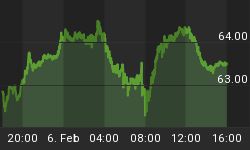New Highs/New Lows Update: Don't forget to watch what is happening on New Highs and New Lows, as they can often be used as Exuberance and Fear indicators.
Most investors have many indicators that they use, but often ignore data from other sources that could confirm or negate the conclusions they drawing about the market.
We will explore two such indicators this morning ... the daily level of New Highs, and New Lows.
Let's start by looking at the 2008 New Highs data. On the New Highs chart, we drew directional lines showing the trend direction on New Highs. Note how the S&P 500 trends relative to the trend of New Highs.
Currently, the New Highs have been dropping, which suggests that the underlying weakness in the market has increased. If the New Highs don't start an up trend soon, then the market will move lower.
New Highs tell a story about investor behavior. Many investors "chase stocks" as they are moving up aggressively.
The more they move up, the more they jump in ... until profit taking occurs, or their fear levels increase.
Then the tide turns and the "chasing activity" diminishes and the number of New Highs start to drop. In one sense, New Highs measures the level of exuberance among investors as a group.

New Lows is another indicator to look at. Spiking levels of New Lows has a definite correlation with sell-offs.
Take a moment to view the correlation between the New Lows and the S&P 500 below.
While New Highs might be associated with investor exuberance levels, New Lows can be associated with investor fear levels and despondency.
Most investors don't sell falling stocks soon enough.
They then are caught in a position where they don't want to take the loss.
Next, they "hope" the stock will come back.
Then, they lose hope and start to panic in the belief that they will lose a lot more. It is at this point where many investors start rushing for the doors and that translates into spiking levels on New Lows.
Note that New Lows have been trending up which is indicating abandonment of stock positions as some investors are losing hope or becoming despondent.
(The New Highs and New Lows charts are posted every day on our paid subscriber site.)
















